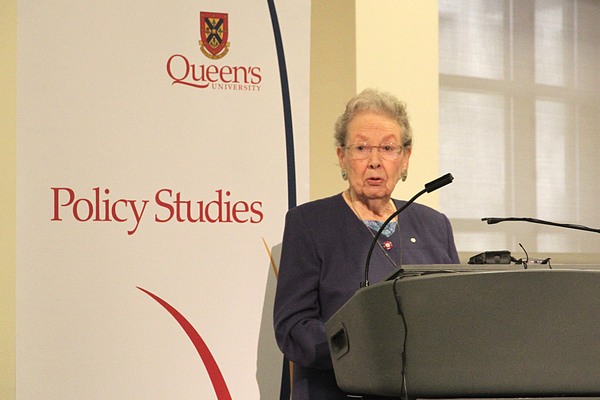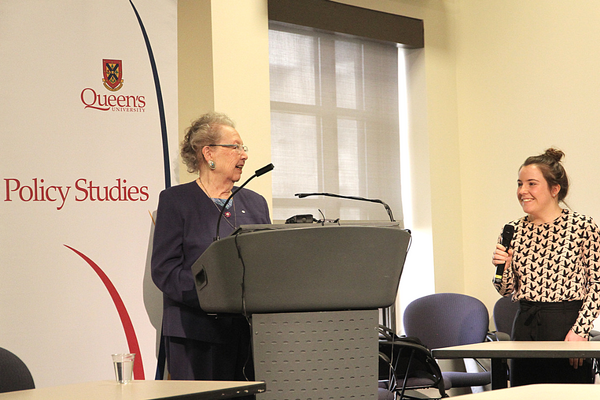Widening the margins of public policy
March 6, 2018
Share

The latest Policy Speakers Series lecture focused on an important conversation for Canada: How do servants of the public good listen to and account for the marginalized in society?
Marlene Brant Castellano, Professor Emerita and former Chair of Indigenous Studies at Trent University, delivered a lecture that highlighted her experience with the long history of institutional suppression of Canada’s Indigenous peoples, and the role that universities can play in bringing marginalized voices to the forefront of public policy.
“How do we reach out across an apparent cultural divide? How do we learn to trust those who would wish to be allies?” asks Dr. Castellano at the beginning of her lecture. “The visceral responses to threat is fight or flight, but there is also a third possibility: strategic engagement.”
Dr. Castellano is the co-chair of the Queen’s Aboriginal Council and a well-respected scholar who provided leadership in the emergence of Indigenous Studies as an academic discipline. As Co-Director of Research with the Royal Commission on Aboriginal Peoples (RCAP) from 1992 to 1996, she laid the groundwork for ethical research of Indigenous people. The overarching mandate of RCAP was to investigate the relationship of Indigenous peoples, the Canadian government, and Canadian society as a whole, and to propose specific solutions to problems faced by Indigenous communities.
“The principals of a renewed relationship, articulated in the final volume of RCAP, were very deliberately framed to connect with values espoused by Aboriginal peoples, and by Canadians: mutual recognition, mutual respect, sharing, and mutual responsibility,” says Dr. Castellano. “The RCAP body of work was a beautiful example of carefully researched, thoughtfully argued, values-sensitive advocacy for acknowledging the presence and dignity of Aboriginal peoples in the Canadian federation.”
But for nearly 20 years, the RCAP report was largely inaccessible due to poor archival practices, expensive digital copy charges, and a lack of interest by the then Minister of Indian Affairs to share the report findings. Recently, the enormous information legacy that RCAP had sought to preserve came back to public view with a new life by Library and Archives Canada, following the release of the 2015 Truth and Reconciliation Commission Report. It is now considered the first resource to build on to create a policy framework to recognize and implement Indigenous rights.

“For the past 50 years, my work has been advocacy – giving voice on issues in forums where Indigenous peoples have no audible voice,” says Dr. Castellano. “My great reward is having strangers approach me with thanks for what I’ve written and spoken about, saying that they knew it, but couldn’t speak on it as I did. Having knowledge is a sacred gift. Sharing it is a sacred responsibility. When truth is uncovered and given breath, carried by your wind spirit, it touches and transforms peoples’ agency – the capacity to make things happen in their own lives and environment.”
The winter lecture series continues until the end of March. The next lecture is ‘Considering Canada’s Renewed Relationship With Indigenous Peoples Through the Rights-based Lens of Inuit Self-determination’ on Tuesday, March 6, presented by Natan Obed, President of the Inuit Tapiriit Kanatami, as part of the 2018 Tom Courchene Distinguished Speaker Series.
For more information about the rest of the winter term lineup, see the Policy Speakers Series website.